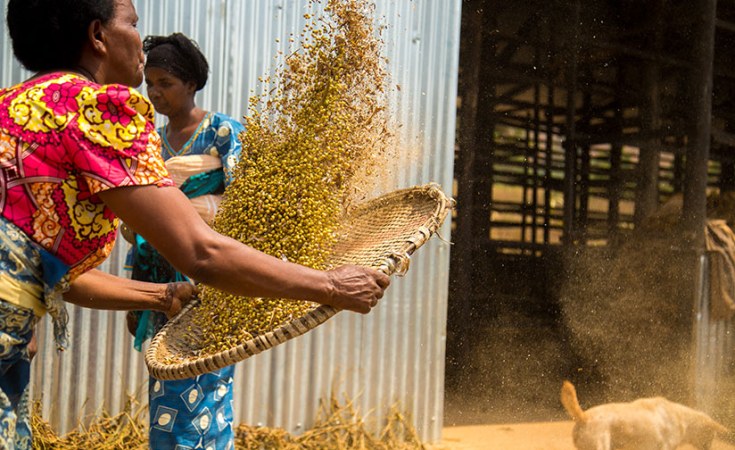Kigali — Adeline Umukunzi, a 28-year-old woman mushroom farmer in Musanze, a district located about 100 km north of the capital Kigali, said women have often been the unseen faces of agribusiness in Rwanda.
"Women have always played a vital role in agriculture, but behind the scenes. We are starting to see more and more female faces in agribusiness," she told IPS.
While she developed high potential and locally-adapted innovations in mushroom farming, the young cultivator was unaware of how much her produce was worth to the market. Little did she know that one local food company had purchased most of her produce to process mushroom-based biscuits and nuggets.
As part of Rwanda's agriculture transformation efforts to enhance agribusiness competitiveness, a growing number of women are now engaged in agribusiness, where many have been able to generate business benefits throughout the value chain.
Official estimates show that in Rwanda, more women than men are primarily engaged in agriculture, yet female farmers face more challenges in starting successful agribusinesses than their male counterparts.
Despite these challenges, the latest official trends show that African women are abandoning traditional ways of engaging in agribusiness and adopting intellectual property (IP) approach to transform food systems on the continent.
According to experts, adopting IP in agribusiness aims to protect goods or services produced in the sector. It mainly deals with trade secrets, described as an essential component for businesses to protect confidential information that provides them a competitive edge.
According to Olivier Kamana, Permanent Secretary in Rwanda's Ministry of Agriculture and Animal Resources, adopting IP rights allows innovators to generate good profits.
Kamana told IPS that key women agripreneurs in Africa could develop commercially viable products, so there needs to be some IP protection to incentivize the innovator.
In many African countries like Rwanda, where agriculture is the backbone of their national economy, experts stress the need to embrace talent, problem-solving ability, and innovation for women.
Official estimates by the UN Food and Agriculture Organization (FAO) indicate that around 62 percent of women in Africa are involved in farming and do the bulk of the work to produce, process, and market food.
According to agriculture experts, business competitiveness in the regional intra-African trading space offered by the African Continental Free Trade Agreement requires agribusiness actors to operate more efficiently, which requires investments in new technologies, new ways of fertilizing and watering crops, and new ways of connecting to the global market.
For Kamana, African women agripreneurs have access to the type of innovations they need to overcome the unique challenges they face.
During the first Africa Regional Intellectual Property (IP) Conference for Women in Agribusiness, which took place in Kigali in May 2023, delegates expressed the desire to promote innovations in women-led agribusinesses in Africa by helping them understand and use IP to bring their ideas to the world.
Bemanya Twebaze, Director General of the African Regional Intellectual Property Organization (ARIPO), is convinced that Intellectual property (IPR) can be a powerful tool in empowering women and guaranteeing that they benefit from their innovations and creations in the agricultural industry.
"Policymakers should encourage and facilitate IP rights for women in agriculture while providing legal and technical aid to maximize their prospects of prosperity," he said.
Agriculture scientists have made breakthroughs in identifying the actors that can be considered innovators to bring agricultural development and increase food production in Africa by examining how intellectual property rights could be largely promoted on the continent.
Estimates show that small farmers, with the majority of women, constitute Africa's most important and most capable innovators, yet this category of the workforce is still struggling to aggregate their produce to supply foreign markets.
Supporters of IPRs argue that though the exclusive monopoly on the invention could impact agriculture in Africa, farming communities across the continent still have difficulty innovating by incorporating new technologies or varieties coming from outside into their production systems.
After graduating from university a few years ago, Rosine Mwiseneza, a young woman agripreneur and manager of BeeGulf company based in Kigali, started beekeeping with only five hives in the Rwamagana district from Eastern Rwanda. Soon after, the number of hives increased to 15 and later to 25.
Mwiseneza told IPS that there had been plenty of opportunity for honey production in Rwanda with the possibility to generate various products across the value chain without intermediaries.
Currently, Mwiseneza's company is producing soaps, candles, and glass containers made from raw beeswax with a target to make appropriate use of IP rights in the stage of this innovation process.
"We are looking to apply for a valid invention patent, and we are confident to get substantial profits from these innovations in the near future," she told IPS.
IPS UN Bureau Report


